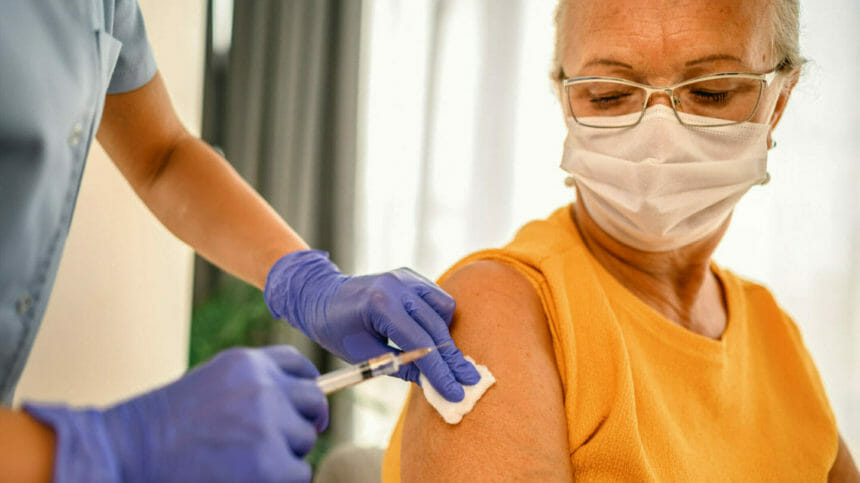
Nursing homes might again find themselves at ground zero of the COVID vaccine efficacy debate this fall, yet wiser for the wear from the early chaotic days of the epidemic.
Experts say the real test will come as facility owners and staff soon confront a “collision” of three things:
• The return of vaccine clinics, only this time better coordinated and better focused at mitigating exponentially more challenging workforce shortage issues;
• The possibly stressful rollout of simultaneous new, more powerful COVID and flu vaccines, in what could be a dangerous flu season; and
• The seemingly fluid (and sometimes conflicting) reporting requirements and guidance from public health officials and regulatory agencies.
There are a lot of moving parts, Chad Worz, PharmD, BCGP, executive director and chief executive officer for the American Society of Consultant Pharmacists, told McKnight’s Long-Term Care News on Tuesday.
“LTC pharmacies and pharmacists are continuing to plan in a variety of ways to address the upcoming flu season. Many are planning vaccine clinics where pharmacists and pharmacy teams may be administering both the influenza vaccine, as well as a possible COVID-19 booster,” Worz explained.
In addition to the COVID boosters, pharmacists are faced with changing guidance from The Centers for Disease Control and Prevention’s Advisory Committee on Immunization Practices. It has recommend one of the differentiated vaccines for influenza for individuals over 65 years, Worz added. This follows recent data suggesting additional protection for this vulnerable age group.
ASCP Director of Policy and Advocacy Jim Lewis noted that the timing of the recommendation created some challenges as many pharmacies had already ordered non-differentiated products. Lewis added that ASCP has been able to work with manufacturers and wholesalers to shift the orders and ensure LTC residents receive the vaccine that will provide the greatest level of protection.
Many providers may also seek extra flu vaccine this fall, given that the Centers for Medicare & Medicaid Services is initiating a new reporting requirement for staff vaccines. Data will be used for a new quality metric starting next year, adding pressure on nursing homes to increase healthcare provider uptake.
The industry should be up to the challenge, said Mary Madison, a veteran clinical consultant for long-term care and senior living for Briggs Healthcare.
“For the past two and half years, we’ve been laser-focused on COVID-19 and by that focus, we managed to keep the incidents and resulting deaths from flu lower than in past seasons,” Madison said.
While experts expressed confidence in greater numbers of improved vaccine clinics this fall, the specter of administering COVID and influenza vaccines at or near the same time has some clinicians a little jittery. Questions also remain about whether a new booster, intended to limit the impact of more recent COVID variants, will be ready in September as previously indicated..
“Throwing COVID boosters into the mix, it just makes it more complicated,” Claire Hannan, executive director of the Association of Immunization Managers, told STAT for a Tuesday article exploring “logistical tangle of the regular flu shot drive,” combined with COVID boosters.
To assuage some concerns, independent ACIP experts have told McKnight’s that older adults will likely be offered one of three adjuvanted or high-dose vaccines over standard vaccines when available. Meanwhile, a recent trial including adults 65 and older showed that influenza and COVID-19 vaccinations are safe and effective when given at the same time.
“This year it feels like this is less of a concern and issue, and I expect to see more concurrent administration,” Worz said about simultaneous vaccinations.




